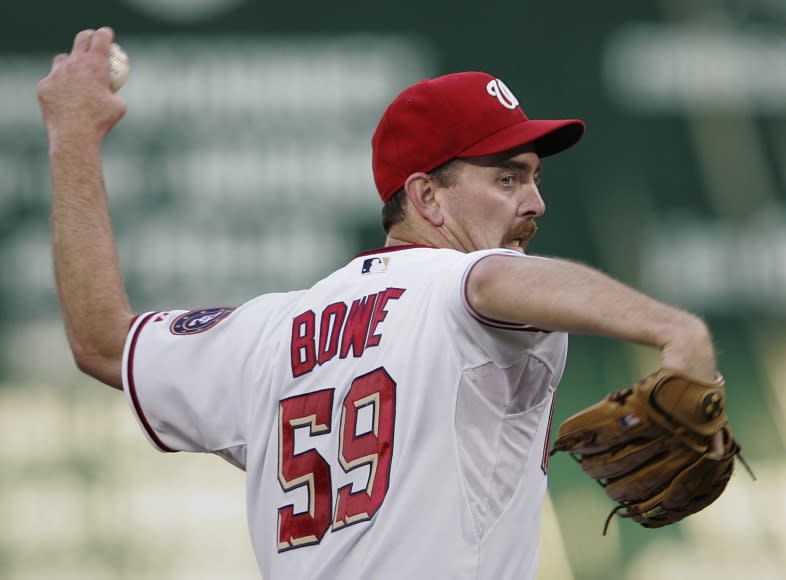Former MLB pitcher seeks financial help from players union as he fights for life

After battling for 15 years to earn fleeting opportunities under the bright lights of Major League Baseball, Micah Bowie is now fighting, literally, for every breath he takes.
In a heartwrenching story from the Washington Times’ Thom Loverro, Bowie revealed the life-threatening health issues he’s been struggling with after a 2016 back surgery spawned critical complications that severely damaged his lungs.
Every day, Bowie requires oxygen therapy in order to stay alive. He says the levels he needs per minute now to care for his lungs are at hospice-level. The battle has been taxing both physically and financially, the latter of which has led Bowie to seek financial help from the Major League Baseball Player’s Association.
It’s help Bowie says he needs before his family goes bankrupt fighting to keep him alive.
It’s also help that Bowie says the MLBPA has denied at every turn.
Baseball’s grind takes its toll
Bowie, 44, was far from an MLB mainstay during his career, but he was always in the mix for an opportunity. He was drafted by the Atlanta Braves in the eighth round of the 1993 MLB Draft, and would go on to pitch professionally until 2008.
In between, Bowie spent parts of six seasons in the big leagues. He debuted as a reliever for the Braves in 1999, but was soon traded to the Chicago Cubs, where he made 11 starts. He would also make appearances for the Oakland Athletics, Washington Nationals and Colorado Rockies.
In total, Bowie appeared in just 88 MLB games, but the grind of preparing for and pitching to achieve those opportunities are what he says contributed to his body breaking down.
In 2010, Bowie spoke to a San Antonio website about the pain he endured during his playing career, and how each new injury would cost him a chance to stick in MLB. At the time, Bowie was overseeing a baseball academy that he hoped would help kids manage the wear and tear of playing baseball at a young age.
“I’ve gone through most every injury that you can go through as a pitcher,” said a then 35-year-old Bowie. “Every time I got hurt, I got released. I lost my livelihood, my job. These kids get hurt, they lose college, they lose opportunity. I don’t want an injury to be the determining factor if they play baseball or not.”
During his career, Bowie underwent Tommy John surgery, in addition to operations to fix a detached latissimus muscle and a torn groin muscle. The back issues, he says, developed over time. When the pain became too much, Bowie sought relief. After consulting with doctors, the decision was made to insert a spinal cord stimulator in August 2016.
Unfortunately, instead of gaining relief, Bowie suffered complications that have damaged his body, challenged his family and threatened his life.
“Now that my lungs are destroyed, about 50 percent of my lungs receive air,” Bowie told the Washington Times. “I have about a 9 percent perfusion rate, which means about 9 percent of my lungs are working.”
The constant worry has been draining on Bowie’s family. But the financial burden attached to his treatment has added another layer of stress. That why’s Bowie, who’s qualified for government disability payments, was hoping to receive further aid from the player’s union.
Benefits denied
When Bowie realized the government aid wouldn’t be enough to cover his bills, he reached out to the players’ union to apply for disability payments under Major League Baseball’s pension plan. He was denied.
When he appealed that decision, he was denied again.
The Washington Times story notes that Bowie falls short of the four full service years that are required to be eligible for automatic disability benefits. Had he spent just 20 more days on a major league roster during his playing career, there would be no issue. Bowie is seeking their help anyway, citing that without the baseball grind breaking down his body, he would not have required surgery or ended up in this serious position.
“We were denied on the appeal,” Bowie says. “I called the union. I talked to a member of the pension committee, one of the guys who had declined my benefits, and he informed me he didn’t even read my case. He just read from the attorney for the pension plan that they could deny it, so without looking at my stuff they just denied me.
“I said how in the world can you deny me and not read my appeal,” Bowie said. “I haven’t gotten anywhere with the union or any pension committee members since that point. It is very disheartening to know this. Because I played Major League Baseball, I am going to bankrupt my family with the injuries it has left me. That’s not right.”
To this point, the players’ union has not publicly commented on Bowie’s requests or the Washington Times story. It’s a situation MLBPA officials have to know will reflect poorly upon the union. But they also know full well that there are guidelines in place. Guidelines that make budging for one player difficult because of the possibilities it might open up for others.
None of that matters much to Bowie. And none of it will stop Bowie, his family, or baseball fans who are now learning of his predicament from asking for an exception to be made. Sometimes public perception can be a driving force in these matters. As Bowie’s health battle continues, he’ll have to hope his growing public support will make a world of difference.
More from Yahoo Sports:
• Robinson: Super Bowl matchup the ticket brokers don’t want
• Championship weekend: Picks against the spread
• Dan Snyder’s yacht has an IMAX theater in it
• Leonard Fournette, Jaguars at odds with each other


